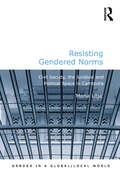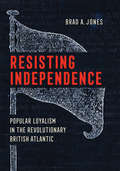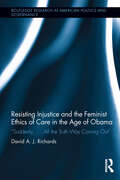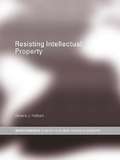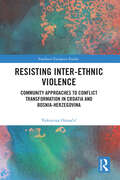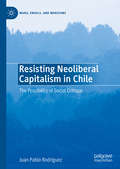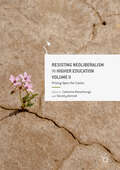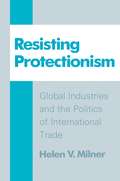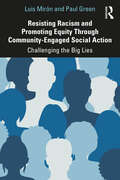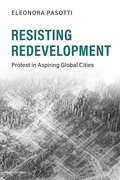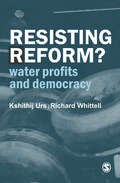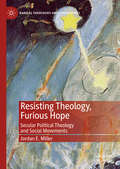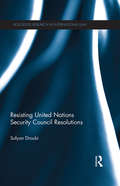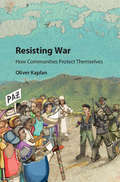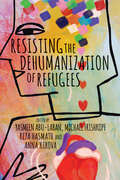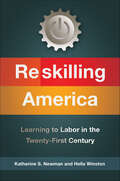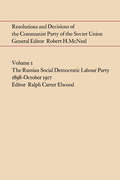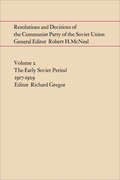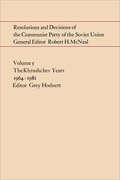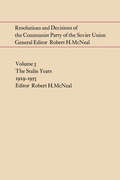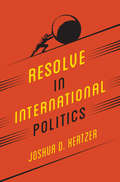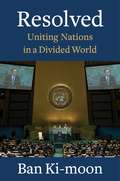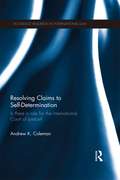- Table View
- List View
Resisting Gendered Norms: Civil Society, the Juridical and Political Space in Cambodia (Gender in a Global/Local World)
by Mona LiljaPolitical scientists have, on occasion, missed subtle but powerful forms of ’everyday resistance’ and have not been able to show how different representations (pictures, statements, images, practices) have different impacts when negotiating power. Instead they have concentrated on open forms of resistance, organized rebellions and collective actions. Departing from James Scott's idea that oppression and resistance are in constant change, Resisting Gendered Norms provides us with a compelling account on the nexus between gender, resistance and gender-based violence in Cambodia. To illustrate how resistance is often carried out in the tension between, on the one hand, universal/globalised representations and, on the other, local ’truths’ and identity constructions, in-depth interviews with civil society representatives, politicians as well as stakeholders within the legal/juridical system were conducted.
Resisting Independence: Popular Loyalism in the Revolutionary British Atlantic
by Brad A. JonesIn Resisting Independence, Brad A. Jones maps the loyal British Atlantic's reaction to the American Revolution. Through close study of four important British Atlantic port cities—New York City; Kingston, Jamaica; Halifax, Nova Scotia; and Glasgow, Scotland—Jones argues that the revolution helped trigger a new understanding of loyalty to the Crown and empire. This compelling account reimagines Loyalism as a shared transatlantic ideology, no less committed to ideas of liberty and freedom than the American cause and not limited to the inhabitants of the thirteen American colonies.Jones reminds readers that the American Revolution was as much a story of loyalty as it was of rebellion. Loyal Britons faced a daunting task—to refute an American Patriot cause that sought to dismantle their nation's claim to a free and prosperous Protestant empire. For the inhabitants of these four cities, rejecting American independence thus required a rethinking of the beliefs and ideals that framed their loyalty to the Crown and previously drew together Britain's vast Atlantic empire. Resisting Independence describes the formation and spread of this new transatlantic ideology of Loyalism. Loyal subjects in North America and across the Atlantic viewed the American Revolution as a dangerous and violent social rebellion and emerged from twenty years of conflict more devoted to a balanced, representative British monarchy and, crucially, more determined to defend their rights as British subjects. In the closing years of the eighteenth century, as their former countrymen struggled to build a new nation, these loyal Britons remained convinced of the strength and resilience of their nation and empire and their place within it.
Resisting Injustice and the Feminist Ethics of Care in the Age of Obama: “Suddenly,…All the Truth Was Coming Out” (Routledge Research in American Politics and Governance)
by David A.J. RichardsDavid A. J. Richards’s Resisting Injustice and The Feminist Ethics of Care in The Age of Obama: "Suddenly,…All The Truth Was Coming Out" builds on his and Carol Gilligan’s The Deepening Darkness to examine the roots of the resistance movements of the 1960s, the political psychology behind contemporary conservatism, and President Obama’s present-day appeal as well as the reasons for the reactionary politics against him. Richards begins by laying out the basics of the ethics of care and proposing an alternative basis for ethics: relationality, which is based in convergent findings in infant research, neuroscience, and evolutionary psychology. He critically analyzes patriarchal politics and states that they are rooted in a reactionary psychology that attacks human relationality and ethics. From there, the book examines the 1960s resistance movements and argues that they were fundamentally oriented around challenging patriarchy. Richards asserts that the reactionary politics in America from the 1960s to the present are in service of an American patriarchy threatened by the resistance movements ranging from the 1960s civil rights movements to the present gay rights movement. Reactionary politics intend to marginalize and even reverse the ethical achievements accomplished by resistance movements—creating, in effect, a system of patriarchy hiding in democracy. Richards consequently argues that Obama’s appeal is connected to his challenge to this system of patriarchy and will examine both Obama’s appeal and the reactions against him in light of the 2012 presidential election. This book positions recent American political development in a broad analysis of the role of patriarchy in human oppression throughout history, and argues that a feminist-based ethics of care is necessary to form a more humane and inclusive democratic politics.
Resisting Intellectual Property (RIPE Series in Global Political Economy)
by Debora J. HalbertOver the past decade, the scope of copyright and patent law has grown significantly, strengthening property rights, even when such rights seem to infringe upon other, more basic, priorities. This book investigates the ways in which activists, scholars, and communities are resisting the expansion of copyright and patent law in the information age.Debora J. Halbert explores how an alternative framework for understanding intellectual property - including about how we ought to think about the issues, the development of social movements around specific issues, and civil disobedience - has developed. Each chapter in the book discusses how resistance is developing in relation to a particular copyright or patent issue such as: access to patented medication access to copyrighted information and music via the Internet the patenting of genetic material. This controversial book examines the ways in which the idea of intellectual property is being re-thought by the victims of an over-expansive legal system. It will appeal to students and researchers from a range of disciplines, from law and political science to computer science, with an interest in intellectual property.
Resisting Inter-Ethnic Violence: Community Approaches to Conflict Transformation in Croatia and Bosnia-Herzegovina (Southeast European Studies)
by Valentina OtmačićThis book analyses the 1991 to 1995 war experiences of ethnically mixed communities who successfully resisted identity-based violence and segregation in Croatia and Bosnia-Herzegovina. Challenging the prevailing view of the wars in these countries as ethnic struggles rooted in historical antagonisms, it adds complexity to our understanding of peace and violence by contributing previously untapped insights into local dynamics of inter-ethnic collaboration. Exploring the strategies and approaches applied to resist violence and to transform conflict in a constructive manner, it provides an important comparative analysis of the experiences and proposes a framework for community resistance to identity-based violence in multi-ethnic societies.This volume will contribute to the ongoing debates of scholars and practitioners on the causes and consequences of violent conflicts, and the related practical approaches to violence prevention and peacebuilding. Highly relevant to scholars and students in peace and conflict studies, political science, international relations, security studies, history, sociology, and social psychology, it willalso be of great interest to policy makers and practitioners in conflict management, conflict transformation and local governance.
Resisting Neoliberal Capitalism in Chile: The Possibility of Social Critique (Marx, Engels, and Marxisms)
by Juan Pablo RodríguezThis book explores the relationship between recent theoretical debates around the fate of critique of neoliberal capitalism and critical theory, on the one hand, and the critical theories generated in and by social movements in Chile, on the other. By taking the idea of social critique as a field that encompasses both critical social theories and the practices of social criticism carried out by social movements, Resisting Neoliberal Capitalism in Chile explores how the student and the Pobladores movements map, resist and contest neoliberal capitalism in commodified areas such as education and housing in Chile, one of the first ‘neoliberal experiments’ in Latin America and the world.
Resisting Neoliberalism in Higher Education Volume II: Prising Open The Cracks (Palgrave Critical University Studies)
by Dorothy Bottrell Catherine ManathungaThis book outlines the creative responses academics are using to subvert powerful market forces that restrict university work to a neoliberal, economic focus. The second volume in a diptych of critical academic work on the changing landscape of neoliberal universities, the editors and contributors examine how academics ‘prise open the cracks’ in neoliberal logic to find space for resistance, collegiality, democracy and hope. Adopting a distinctly postcolonial positioning, the volume interrogates the link between neoliberalism and the ongoing privileging of Euro-American theorising in universities. The contributors move from accounts of unmitigated managerialism and toxic workplaces, to the need to decolonise the academy to, finally, illustrating the various creative and counter-hegemonic practices academics use to resist, subvert and reinscribe dominant neoliberal discourses. This hopeful volume will appeal to students and scholars interested in the role of universities in advancing cultural democracy, as well as university staff, academics and students.
Resisting Protectionism: Global Industries and the Politics of International Trade
by Helen V. MilnerWhy didn't the protectionist spiral of the 1920s reappear in the 1970s in light of similar economic and political realities? In Resisting Protectionism, Helen Milner analyzes the growth of international economic interdependence and its effects on trade policy in the United States and France. She argues that the limited protectionist response of the 1970s stems from the growth of firms' international economic ties, which reduces their interest in protection by increasing its cost. Thus firms with greater international connections will be less protectionist than more domestically oriented firms. The book develops this thesis by examining the international ties of export dependence, multinationality, and global intra-firm trade. After studying selected U.S. industries, Milner also examines French firms to see if they respond to increased interdependence in the same way as American firms, despite their different historical, ideological, and political contexts.
Resisting Racism and Promoting Equity Through Community-Engaged Social Action: Challenging the Big Lies
by Paul Green Luis MirónThis book challenges pre-service and in-service educators to reflect critically on their assumptions and engage in praxis promoting racial and social equity. Grounded in policy contexts, historical understandings, and critical theories, this book describes innovative community-engaged approaches to resisting racism and promoting equity and features reflections and personal narratives from partners in change—including on-the-ground activists, voices from younger and older generations, educators, and first-time writers. Fueled by the ideology of white supremacy for over four centuries that whites matter more than Blacks, the authors argue that racial inequities exacerbated during the Trump administration and the legacy of neo-liberal policies dating to the "New Federalism" fiercely necessitate invoking community-engaged strategies to advance equity. This book advocates for collaboration among schools, community organizations, businesses, university centers, and community activists to address historically pressing issues, including systemic racism, declining educational opportunities, limited access to ongoing health care, and the decline of civility in public life.
Resisting Redevelopment: Protest in Aspiring Global Cities (Cambridge Studies in Contentious Politics)
by Eleonora PasottiThe politics of urban development is one of the most enduring, central themes of urban politics. In Resisting Redevelopment, Eleonora Pasotti explores the forces that enable residents of “aspiring global cities,” or economically competitive cities, to mobilize against gentrification and other forms of displacement, as well as what makes mobilizations successful. Scholars and activists alike will benefit from this one-of-a-kind comparative study. Impressive in its scope, this book examines twenty-nine protest campaigns over a decade in ten major cities across five continents, from Santiago to Seoul to Los Angeles. Pasotti sheds light on an approach that is both understudied and remarkably effective – the practice of successful organizers deploying “experiential tools,” or events, social archives, neighborhood tours, and performances designed to attract participants and transform the protest site into the place to be. With this book, Pasotti promises to provide a creative and novel contribution to the literature of contentious politics.
Resisting Reform?: Water Profits and Democracy
by Kshithij Urs Richard WhittellA wide range of people and organisations, united by either a belief in market-based economics or a financial stake in the water business or both, are convinced that water should primarily be treated as a commodity to be bought and sold so that all water services can cover their costs. To this end, they advocate private ownership of water supply with the underlying objective of profit generation. Unfortunately, the benefits of such reasoning are skewed, and while it has been put into practice around the world, many people have come out as losers in this bargain. Resisting Reform? Water Profits and Democracy critically examines the attempts that have been made to ‘reform’ Bangalore’s water supply and situates them in their global and national context and in that of the city’s broader development. It looks at how the ‘reforms’ have entered government policy and how they have been opposed, principally by the many poor in the city. This book also describes how involving private players is not the best way to ensure an equitable water supply and that treating water as a commodity is a dangerous principle to adopt for running any water service, be it public or private. This book will be a rich resource for professionals and activists working in the areas of natural resources management, globalisation, development studies and public policy. It will also be of much interest to research scholars and media and policy watchers.
Resisting Theology, Furious Hope: Secular Political Theology and Social Movements (Radical Theologies and Philosophies)
by Jordan E. MillerThis book puts radical theology and political theology into an interdisciplinary conversation with sustained and serious readings of resistance. Using an anthropology of ritual as a common thread, Jordan E. Miller explores the reality of the relationship between political theology, radical theology, and political theory, action, and power without cynicism in a creative, forward-moving way. The first half of the book develops a radical political theology and the second half applies that theory to a series of social movements, including The AIDS Coalition to Unleash Power (ACT UP), Occupy Wall Street, and #BlackLivesMatter, and includes reflections on the events at Standing Rock, ND.
Resisting United Nations Security Council Resolutions (Routledge Research in International Law)
by Sufyan DroubiThe United Nations Security Council has primary responsibility for maintaining international peace and security. In discharging its powers it must act in accordance with the Purposes and Principles of the UN, and observe the rules governing voting and procedure established in the Organisation’s Charter. The Council adopts mandatory resolutions that may establish obligations for members and non-members, and such obligations trump conflicting obligations originating from any other international agreement. Member States must cooperate with the Organisation and among themselves, in the implementation of any action prescribed by the Council against States whose behaviour the Council considers an act of aggression, or a threat to, or breach of, international peace and security. This book analyses resistance to Security Council resolutions and puts forward a theory of lawful resistance. Sufyan Droubi takes a positivist approach to the UN Charter regarding it as a constitution. Special emphasis is placed on the construction of the Charter’s meaning through the practice of both organs and Members of the UN and on the need to enhance the effectiveness of the Organization with due respect to the rule of law. The book proposes that nonviolent resistance to a mandatory resolution of the Security Council, on grounds that the latter is incompatible with the Charter or jus cogens norms, may be considered lawful under the Charter if some elements are present. In exploring a number of case studies of individual and collective State resistance to mandatory Council resolutions, the book proposes that resistance may function as a rudimentary instrument of accountability and protection of the Charter and jus cogens, in the absence of more mature mechanisms of judicial review. The book will be of excellent use and interest to scholars and students of constitutional international law and international relations.
Resisting War
by Oliver KaplanIn civil conflicts around the world, unarmed civilians take enormous risks to protect themselves and confront heavily armed combatants. This is not just counterintuitive - it is extraordinary. In this book, Oliver Kaplan explores cases from Colombia, with extensions to Afghanistan, Pakistan, Syria, and the Philippines, to show how and why civilians influence armed actors and limit violence. Based on fieldwork and statistical analysis, the book explains how local social organization and cohesion enable both covert and overt nonviolent strategies, including avoidance, cultures of peace, dispute resolution, deception, protest, and negotiation. These 'autonomy' strategies help civilians retain their agency and avoid becoming helpless victims by limiting the inroads of armed groups.
Resisting the Dehumanization of Refugees
by Reza Hasmath Yasmeen Abu-Laban Anna Kirova Michael FrishkopfRefugees face distinct challenges and are often subject to dehumanization by politicians, media, and the public. In this context, Resisting the Dehumanization of Refugees provides urgent insights and policy relevant perspectives to improve refugees’ social well-being and integration. Taking a transdisciplinary approach, scholars from the social sciences, arts, and humanities, alongside practitioners and refugees, explore what it means to experience dehumanization. They consider how refugees’ experiences of dehumanization inform both epistemological and practical approaches to humanizing (or re-humanizing) refugees before, during, and after resettlement. By addressing these important issues, contributors marshall rich and multidimensional responses that draw upon our shared humanity and reveal new possibilities for change.
Resisting the European Court of Justice
by Bill DaviesThe European Union's (EU) powerful legal framework drives the process of European integration. The Court of Justice (ECJ) has established a uniquely effective supranational legal order, beyond the original wording of the Treaty of Rome and transforming our traditional understanding of international law. This work investigates how these fundamental transformations in the European legal system were received in one of the most important member states, Germany. On the one hand, Germany has been highly supportive of political and economic integration; yet on the other, a fundamental pillar of the post-war German identity was the integrity of its constitutional order. How did a state whose constitution was so essential to its self-understanding subscribe to the constitutional practice of EU law, which challenged precisely this aspect of its identity? How did a country who could not say "no" to Europe become the member state most reluctant to accept the new power of the ECJ?
Reskilling America: Learning to Labor in the Twenty-First Century
by Katherine S. Newman Hella WinstonFrom Katherine Newman, award-winning author of No Shame in My Game, and sociologist Hella Winston, a sharp and irrefutable call to reenergize this nation's long-neglected system of vocational trainingAfter decades of off-shoring and downsizing that have left blue collar workers obsolete and stranded, the United States is now on the verge of an industrial renaissance. Companies like Apple, BMW, Bosch, and Volkswagen are all opening plants and committing millions of dollars to build products right here on American soil. The only problem: we don't have a skilled enough labor pool to fill these positions, which are in many cases technically demanding and require specialized skills. A decades-long series of idealistic educational policies with the expressed goal of getting every student to go to college has left a generation of potential workers out of the system. Touted as a progressive, egalitarian institution providing opportunity even to those with the greatest need, the American secondary school system has in fact deepened existing inequalities, leaving behind millions of youth, especially those who live in the de-industrialized Northeast and Midwest, without much of a future at all. We can do better, argue acclaimed sociologists Katherine Newman and Hella Winston. Taking a page from the successful experience of countries like Germany and Austria, where youth unemployment is a mere 7%, they call for a radical reevaluation of the idea of vocational training, long discredited as an instrument of tracking. The United States can prepare a new, high-performance labor force if we revamp our school system to value industry apprenticeship and rigorous technical education. By doing so, we will not only be able to meet the growing demand for skilled employees in dozens of sectors where employers decry the absence of well trained workers -- we will make the American Dream accessible to all.
Resocialising Europe in a Time of Crisis
by Nicola Countouris Mark FreedlandTerms such as 'Social Europe' and 'European Social Model' have long resided in the political and regulatory lexicon of European integration. But arguably, with the inclusion of a 'Solidarity' chapter in the Charter of Fundamental Rights, the EU social profile has entered a deep period of crisis. The ECJ judgments exemplify the unresolved tension between the EU's strong market imperatives and its fragile social aspirations while the ongoing economic crisis and the social conditions attached to 'bail out' packages are further indication of the continuing social retrenchment of social rights. The status quo is one in which workers appear to shoulder most of the risks attendant on making and executing arrangements for the doing of work. Chapters in this book advocate a reversal of this trend in favour of fair mutualization, so as to disperse these risks and share them more equitably between employers, the state, and society at large.
Resolutions and Decisions of the Communist Party of the Soviet Union Volume 1: The Russian Social Democratic Labour Party 1898-October 1917
by Ralph ElwoodThis set of four volumes is an indispensable reference work for the study of modern Russia in general and Soviet Communism in particular. Ever since its foundation on the eve of the twentieth century, the organization now called the Communist Party of the Soviet Union has been embodying its major policies in documents called 'resolutions and decisions.' These form a much more continuous and extensive record of the evolution of Soviet Communism than the writings of any single leader, and the standard Soviet anthology of these materials has gone through eight editions over a fifty-year period. Yet most of this essential material has been available only in Russian, and even in that language the standard editions have been marred by selectivity and editorial comment that is often politically motivated. At last students of modern Russian studies have access to a multi-volume work that not only presents the most important Communist Party resolutions and decisions in English, but also amplifies the standard Soviet anthology in important respects and provides editorial explanation that is independent of Kremlin politics. The rich store of materials in these four volumes ranges from the formation of the party to the fall of Khrushchev, and it deals with a wide range of issues. The clearly organized volumes each contain a major introductory essay as well as shorter background essays on each party congress, conference or Central Committee plenum. The documents approved by these meetings are often fundamental in importance, but the centralist operation of the party in power has been such that many of the most vital decisions have been issued in the name of the Central Committee when there was no meeting of that body at all. It is one of the signal achievements of these volumes that the selection of materials included was based on a list of all known part decisions, whether or not they have been included in the main Soviet reference work. The four volumes in this series are edited as an integral set. Each contains a subject index in which Russian abbreviations and acronymic names are translated. Tables summarizing the personnel of the main party executive bodies since 1917 are also provided. At the same time each of the volumes is built around a coherent period in the development of Russian Communism, and each reflects the special features of its time.Volume 1 treats the period before the October Revolution of 1917. It is the first collection of materials on the early evolution of the Russian Social Democratic Party that deals with the entire movement, so that the interaction of the various factions of the party may be understood as a whole and not merely in a partisan Leninist framework. This volume also breaks new ground in publishing in English vital records of Communist activity during the Revolution of 1917.
Resolutions and Decisions of the Communist Party of the Soviet Union Volume 2: The Early Soviet Period 1917-1929
by Richard GregorThis set of four volumes is an indispensable reference work for the study of modern Russia in general and Soviet Communism in particular. Ever since its foundation on the eve of the twentieth century, the organization now called the Communist Party of the Soviet Union has been embodying its major policies in documents called 'resolutions and decisions.' These form a much more continuous and extensive record of the evolution of Soviet Communism than the writings of any single leader, and the standard Soviet anthology of these materials has gone through eight editions over a fifty-year period. Yet most of this essential material has been available only in Russian, and even in that language the standard editions have been marred by selectivity and editorial comment that is often politically motivated. At last students of modern Russian studies have access to a multi-volume work that not only presents the most important Communist Party resolutions and decisions in English, but also amplifies the standard Soviet anthology in important respects and provides editorial explanation that is independent of Kremlin politics. The rich store of materials in these four volumes ranges from the formation of the party to the fall of Khrushchev, and it deals with a wide range of issues. The clearly organized volumes each contain a major introductory essay as well as shorter background essays on each party congress, conference or Central Committee plenum. The documents approved by these meetings are often fundamental in importance, but the centralist operation of the party in power has been such that many of the most vital decisions have been issued in the name of the Central Committee when there was no meeting of that body at all. It is one of the signal achievements of these volumes that the selection of materials included was based on a list of all known part decisions, whether or not they have been included in the main Soviet reference work. The four volumes in this series are edited as an integral set. Each contains a subject index in which Russian abbreviations and acronymic names are translated. Tables summarizing the personnel of the main party executive bodies since 1917 are also provided. At the same time each of the volumes is built around a coherent period in the development of Russian Communism, and each reflects the special features of its time. Volume 2 deals with the period from the October Revolution to the establishment of Stalin's regime. Documents from this period emphasize the transformation of the party into a new kind of bureaucratized authority, controlling such areas as the press, trade unions, armed forces, and youth organization. Factionalism within the party and its suppression are a major theme. The volume opens with the documents (previously unavailable in English) concerning Lenin's crisis of control within the Central Committee shortly after the seizure of power, and it goes on to provide extensive material on both Lenin's and Stalin's suppression of critical groups within the party.
Resolutions and Decisions of the Communist Party of the Soviet Union Volume 5: The Brezhnev Years 1964-1981
by Donald SchwartzThis set of four volumes is an indispensable reference work for the study of modern Russia in general and Soviet Communism in particular. Ever since its foundation on the eve of the twentieth century, the organization now called the Communist Party of the Soviet Union has been embodying its major policies in documents called 'resolutions and decisions.' These form a much more continuous and extensive record of the evolution of Soviet Communism than the writings of any single leader, and the standard Soviet anthology of these materials has gone through eight editions over a fifty-year period. Yet most of this essential material has been available only in Russian, and even in that language the standard editions have been marred by selectivity and editorial comment that is often politically motivated. At last students of modern Russian studies have access to a multi-volume work that not only presents the most important Communist Party resolutions and decisions in English, but also amplifies the standard Soviet anthology in important respects and provides editorial explanation that is independent of Kremlin politics. The rich store of materials in these four volumes ranges from the formation of the party to the fall of Khrushchev, and it deals with a wide range of issues. The clearly organized volumes each contain a major introductory essay as well as shorter background essays on each party congress, conference or Central Committee plenum. The documents approved by these meetings are often fundamental in importance, but the centralist operation of the party in power has been such that many of the most vital decisions have been issued in the name of the Central Committee when there was no meeting of that body at all. It is one of the signal achievements of these volumes that the selection of materials included was based on a list of all known part decisions, whether or not they have been included in the main Soviet reference work. The four volumes in this series are edited as an integral set. Each contains a subject index in which Russian abbreviations and acronymic names are translated. Tables summarizing the personnel of the main party executive bodies since 1917 are also provided. At the same time each of the volumes is built around a coherent period in the development of Russian Communism, and each reflects the special features of its time. Volume 5 covers Brezhnev's consolidation of power; the limits set on his rule are traced through leadership changes, institutional reforms, and policy development. The major industrial reforms, and policy development. The major industrial and agricultural reforms introduced under Brezhnev are documented, as are the struggle to implement the reforms, the resistance of managerial elites and workers, and Brezhnev's attempt to modernize the Soviet economy and improve levels of efficiency and productivity. Internal party changes reflecting the stable oligarchy that emerged after Khrushchev's removal are included, as well as Brezhnev's commitment to security of tenure for cadres and the changing nature and role of the purge. Party efforts to upgrade recruitment procedures, to change the qualitative composition of the party, to improve the procedures for ensuring routinization and responsiveness in the conduct of party business, and to upgrade the party education system are also documented. Evidence is provided of the party's struggle with corruption in the Georgian Republic and the regime's inability to cope effectively with the widespread growth of social problems. The volume conveys the flavour of oligarchic and bureaucratic politics that emerged with Brezhnev's style of leadership.
Resolutions and Decisions of the Communist Party of the Soviet Union, Volume 3: The Stalin Years 1929-1953
by Robert McnealThis set of four volumes is an indispensable reference work for the study of modern Russia in general and Soviet Communism in particular. Ever since its foundation on the eve of the twentieth century, the organization now called the Communist Party of the Soviet Union has been embodying its major policies in documents called 'resolutions and decisions.' These form a much more continuous and extensive record of the evolution of Soviet Communism than the writings of any single leader, and the standard Soviet anthology of these materials has gone through eight editions over a fifty-year period. Yet most of this essential material has been available only in Russian, and even in that language the standard editions have been marred by selectivity and editorial comment that is often politically motivated. At last students of modern Russian studies have access to a multi-volume work that not only presents the most important Communist Party resolutions and decisions in English, but also amplifies the standard Soviet anthology in important respects and provides editorial explanation that is independent of Kremlin politics. The rich store of materials in these four volumes ranges from the formation of the party to the fall of Khrushchev, and it deals with a wide range of issues. The clearly organized volumes each contain a major introductory essay as well as shorter background essays on each party congress, conference or Central Committee plenum. The documents approved by these meetings are often fundamental in importance, but the centralist operation of the party in power has been such that many of the most vital decisions have been issued in the name of the Central Committee when there was no meeting of that body at all. It is one of the signal achievements of these volumes that the selection of materials included was based on a list of all known part decisions, whether or not they have been included in the main Soviet reference work. The four volumes in this series are edited as an integral set. Each contains a subject index in which Russian abbreviations and acronymic names are translated. Tables summarizing the personnel of the main party executive bodies since 1917 are also provided. At the same time each of the volumes is built around a coherent period in the development of Russian Communism, and each reflects the special features of its time. Volume 3 treats the Stalin era, the early phase of which witnessed a new degree of party intervention in agriculture, industry, and cultural affairs. The ambivalent relation between the party and Stalin's great purge emerges in party decisions of the later thirties, including an archival document never published in the Soviet Union and some little known material on the Central Committee plenum of February-March 1937. The Zhdanov campaign in the arts following the World War is also represented by the party resolutions translated in this volume.
Resolve in International Politics
by Joshua D. KertzerWhy do some leaders and segments of the public display remarkable persistence in confrontations in international politics, while others cut and run? The answer given by policymakers, pundits, and political scientists usually relates to issues of resolve. Yet, though we rely on resolve to explain almost every phenomenon in international politics--from prevailing at the bargaining table to winning on the battlefield--we don't understand what it is, how it works, or where it comes from. Resolve in International Politics draws on a growing body of research in psychology and behavioral economics to explore the foundations of this important idea.Joshua Kertzer argues that political will is more than just a metaphor or figure of speech: the same traits social scientists and decision-making scholars use to comprehend willpower in our daily lives also shape how we respond to the costs of war and conflict. Combining laboratory and survey experiments with studies of great power military interventions in the postwar era from 1946 to 2003, Kertzer shows how time and risk preferences, honor orientation, and self-control help explain the ways leaders and members of the public define the situations they face and weigh the trade-offs between the costs of fighting and the costs of backing down.Offering a novel in-depth look at how willpower functions in international relations, Resolve in International Politics has critical implications for understanding political psychology, public opinion about foreign policy, leaders in military interventions, and international security.
Resolved: Uniting Nations in a Divided World
by Ban Ki-moonBorn just one year before the United Nations itself, Ban Ki-moon came of age with the world body. His earliest memories are haunted by the sound of bombs dropping on his Korean village and the sight of fires consuming what remained. The six-year-old boy fled with his family, trudging for miles in mud-soaked shoes, suffering from incessant hunger, and wondering how they would survive—until the United Nations rescued them. Young Ban Ki-moon grew up determined to repay this lifesaving generosity.Resolved is Ban Ki-moon’s personal account of his decade at the helm of the organization during a period of historic turmoil and promise. Meeting challenges and resistance with a belief in the UN’s mission of peace, development, and human rights, he steered the United Nations through a volatile period that included the Arab Spring, nuclear pursuits in Iran and North Korea, the Ebola epidemic, and brutal new conflicts in Central Africa. As secretary-general, Ban also forged global agreements to fight extreme poverty and address the climate crisis.Ban performed what has been called “the most impossible job on this earth” with a genuine belief in collective action and global transformation. Freed from the diplomatic constraints of a lifetime of public service, he offers a candid assessment of the people and events that shape our era and a bracing analysis of what lies ahead.
Resolving Claims to Self-Determination: Is There a Role for the International Court of Justice? (Routledge Research in International Law)
by Andrew ColemanSince the end of World War Two and the formation of the UN, the nature of warfare has undergone changes with many wars being ‘intra-state’ wars, or wars of secession. Whilst wars of secession do not involve the same number or type of combatants as in the last two World Wars, their potential for destruction and their danger for the international community cannot be underestimated. There are currently many peoples seeking independence from what they perceive as foreign and alien rulers including the Chechens, West Papuans, Achenese, Tibetans, and the Kurds. The break-up of Yugoslavia and the former USSR, together with recent conflicts in South Ossetia, reveal that the potential for future wars of secession remains high. This book explores the relationship between recognition, statehood and self-determination, and shows how self-determination continues to be relevant beyond European decolonisation. The book considers how and why unresolved questions of self-determination have the potential to become violent. The book goes on to investigate whether the International Court of Justice, as the primary judicial organ of the United Nations, could successfully resolve questions of self-determination through the application of legal analysis and principles of international law. By evaluating the strengths, weaknesses and effectiveness of the Court’s advisory jurisdiction, Andrew Coleman asks whether the ICJ is a suitable forum for these questions, and asks what changes would be necessary to provide an effective means for the peaceful "birth" of States.
